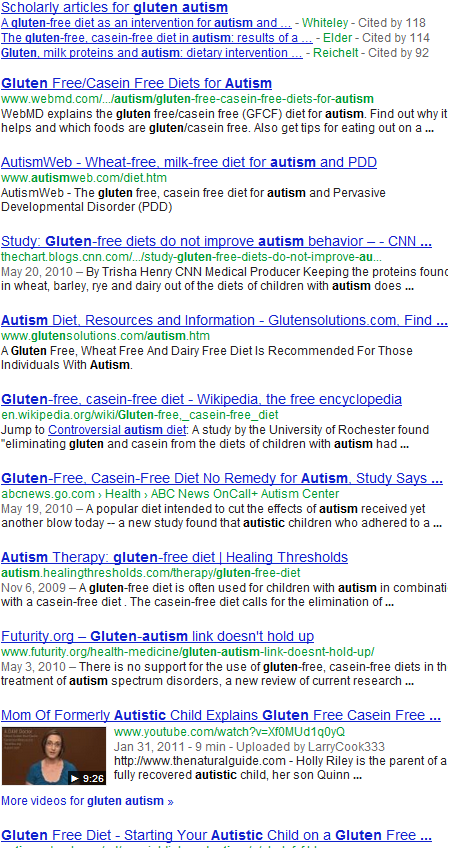(Click here to play the game yourself.)
A friend and I just accidentally invented a fun game. I like it because it cutely illustrates the current completely ridiculous state of our understanding of human nutrition. Namely, there’s an amazingly long list of things that people think about nutrition–such a long list that it’s just really really hard to imagine even a small fraction of these things actually being true.
(I have a lot more to say about human nutrition than just this. In short, I am extremely skeptical of any claims about human nutrition. I sort of touched on this in this old blog post on my poker blog, and I might do a bit more in the future.)
Anyway, here’s the game:
- Choose something that people eat that some people think might have effects on your health (e.g. trans fats or calcium or acai berries).
- Choose a word or phrase that is somehow related to human health (e.g. “asthma” or “concentration” or “bad for you”).
- Google them together.
- Watch as hilarity ensues.
For example, let’s choose gluten and autism. Here’s what I get:
(Note that your results may vary a bit, especially if you’re not in the United States or are currently logged into a Google account. The gist should be the same, though.)
I chose gluten and autism entirely because they’re the first two seemingly unrelated things that popped into my head, and there are 3.3 million results! There are preliminary studies that are essentially useless for drawing conclusions (because of small sample sizes, lack of control, etc.) that are nevertheless widely cited; there are lots of websites devoted to telling people that a gluten-free diet will cure autism; there are some news articles and the like about larger studies that show absolutely no effect and debate the plausibility; and, there’s even a video of a woman who claims that her child’s autism was cured by a gluten-free (and casein-free) diet. (The woman is selling something, of course.)
And, these results are roughly typical, as you can confirm yourself. Indeed, if you Google just about any combination of a food/nutrient and something related to your health, you’ll find that lots of people believe that the two are strongly linked. Check out what fish oil reportedly does to men’s penises or the surprising effects that calcium probably doesn’t actually have on your weight or what some people think spinach does to your vision. So far, I think that the funniest one that I’ve found is the reported effect of breast milk on Alzheimer’s disease.
Anyway, I thought that was kind of funny. Here’s a little script I wrote so you can try it yourself. Seriously, give it a try.

This is an awesome idea but neither the script nor your links work for me in FF 11. Just takes me to my iGoogle page. You should probably be using this form instead: http://www.google.com/search?q=calcium+obesity
Thanks for letting me know! Fixed now.
As someone who is deeply interested in journalism, science, XKCD and poker, I’ve been a fan of yours for a while. Somehow I just came across this blog, and it’s definitely a quality read. Keep up the good work!
Regarding the post itself, I’m similarly suspicious of various nutritional claims. While I’m sure there’s some sound fundamental science underlying the raw basics (how your body processes carbs and proteins, for example), it feels like every month a new nutritional claim is grabbing the headlines. I’m inherently wary of all of them just by the speed with which new studies come and go; since so few of them have staying power, this makes it impossible IMO to take any of them seriously. Understanding nutrition is undoubtedly an immensely difficult project (as is anything biological), but I’d prefer to wait until there’s a substantial body of evidence backing a particular nutritional claim before altering my dietary habits accordingly. The nice thing about this Kuhnian approach is that I don’t have to read every study all the time; I can just take the meta-approach of waiting for a consensus to emerge.
What are your thoughts on cell phones and cancer?
Hi Zeke,
Thanks for the kind words!
As far as I can tell, there’s absolutely no reason to believe that cell phones can cause cancer. There seems to be no empirical evidence, and there’s no plausible mechanism. Radiation can cause cancer, but that radiation is much higher energy and can actually break molecular bonds. Cell phone radiation are have like 15 orders of magnitude less energy than they’d need to be able to do that.
-Noah